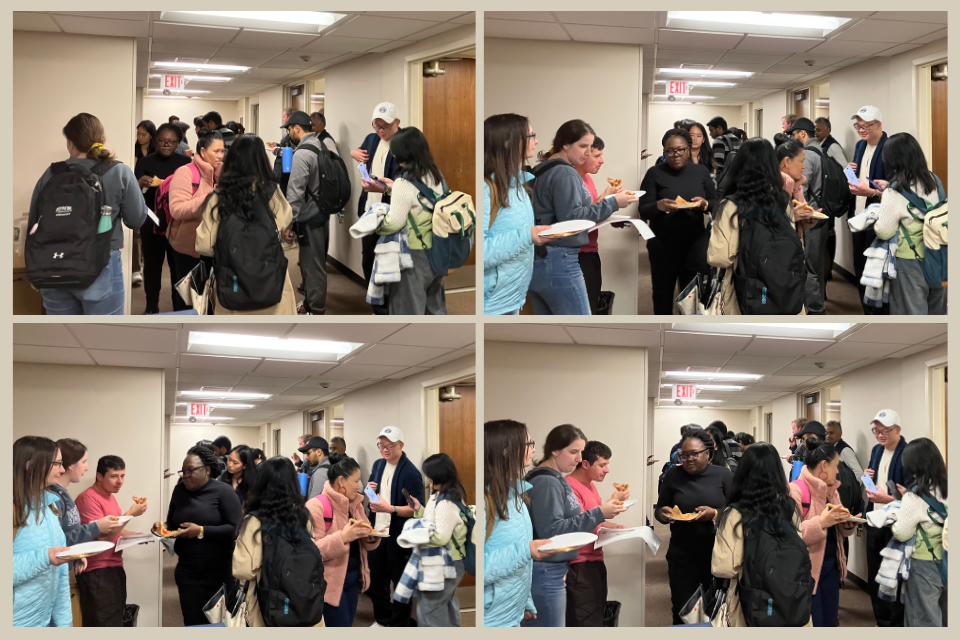Fall 2023 I-Corps Cohort Off to Strong Start

The Brandeis Innovation I-Corps program kicked off the in-person portion of its Fall cohort yesterday with a lively meeting in the Brandeis Innovation Center's training space.
I-Corps, a program of the National Science Foundation, aims to identify university technologies with strong commercial potential, and support the evaluation of those inventions for potential commercialization. Participating I-Corps sites at select universities across the country provide training and funding to help scientists and engineers translate their research into successful startups. The program follows the business model canvas framework pioneered by serial entrepreneur and Stanford instructor Steve Blank, which provides a proven curriculum for learning how to launch a successful technology venture. At the core of the program is a process called customer discovery, a method of in-depth market research that aims to uncover hidden needs in the market through extensive qualitative data collection in the form of interviews with key stakeholders across a specific industry. The goal is to gain a deep understanding of the target market, and use that knowledge to develop a business model that will effectively meet the needs of potential customers.
At Brandeis, the I-Corps site, one of only ten in New England, is run by the Brandeis Innovation Center, and provides fellowships to students across campus to learn innovation through the process of customer discovery. Business, humanities, social science, and STEM students come together to learn how to turn ideas developed in Brandeis labs into impactful products and services. The program also offers mentorship from experienced entrepreneurs and investors, as well as access to resources such as prototyping tools and market validation workshops.
In addition to helping students gain practical skills in entrepreneurship, the I-Corps program has a broader impact on the innovation ecosystem at Brandeis. By connecting Brandeis inventors with potential customers and investors, the program creates opportunities for collaboration and partnership between academia and industry.
The Fall cohort at Brandeis is off to an exciting start, with teams already diving into customer discovery and refining their business models. The program will culminate in a presentation where Fellows will share their learning, progress, and next steps with the Brandeis community. The program not only teaches innovation and entrepreneurship, but also serves as a way to move technologies forward on the path to commercialization.
This Fall cohort is comprised of seven teams, each with a unique technology that has been developed at Brandeis University. The teams were carefully selected through a rigorous application process, and represent a diverse range of fields including biology, chemistry, computer science, materials science and neuroscience:
- Colibody - a platform for making synthetic single domain Antibody library as a research tool (PI: Michael Marr; Technical Lead: Will Dahl)
- Therapy for cancer and other diseases using galectin inhibitors (PI: Isaac Krauss; Technical Lead Kayla Cerri)
- Energy efficient method to store solar energy for later use (PI: Grace Han; Technical Lead: Subhayan Chakraborty)
- Hypertension treatment for patients resistant to current therapies (PI: Sue Birren; Technical Lead: Josh Harrison)
- A new platform for identifying kinase inhibitors for cancer treatment (PI:Liz Hedstrom; Technical Lead: Estheban Osorio)
- A new approach to identify antivirals (PI: Maria-Eirini Pandelia; Technical Lead: Trent Quist)
- Machine learning methods for remote assessment of cognitive function (PI: Margie Lachman; Technical Lead: Sara Motoyama)
During the Tuesday session, teams met for the first time in person, brainstormed creative team names, and began to identify target markets for their inventions. They also learned about the importance of validating their assumptions and understanding their potential target markets before diving into customer discovery.
As the students progress through the program, they will continue to receive guidance and support from mentors and industry experts, as well as attend workshops on topics such as intellectual property protection, business plan development, and investor pitching. New this year is the Innovator in Residence program. Through this program, Rachel Meyers ‘84, an experienced innovator, will attend the weekly meetings, mentor teams, and provide valuable feedback on entrepreneurship based on her experience. This comprehensive approach ensures that not only do the students gain valuable skills, but also that the innovations going through the program have a greater chance of success in the market. “I-Corps is an amazing opportunity for Brandesians to hone their skills in entrepreneurship, while helping our inventors discover promising ways to bring their inventions to market and commercialize them,” says Rebecca Menapace, Associate Provost for Innovation. “The Brandeis Innovation I-Corps site is more than just a fact-finding program to identify market opportunities for scientific discoveries - it’s a community of innovators who bring diverse talents to each team, creating a space for breakthroughs to happen.”